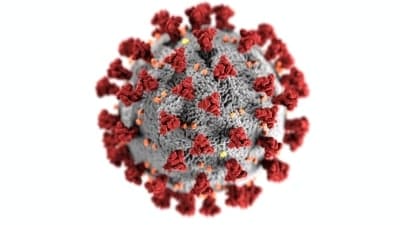New Delhi, Dec 9 : Even as the world cheers the progress being made on several vaccines to protect against the Covid-19 pandemic, there is great excitement now on Molnupiravir, a new anti-viral drug which according to latest research completely suppresses virus transmission within 24 hours.
If these ferret-based data translate to humans, Covid-19 patients treated with the drug could become non-infectious within 24 hours after the beginning of treatment. The drug is in advance phase II/III clinical trials against the SARS-CoV-2 infection. Molnupiravir is being developed by biotechnology firm Ridgeback Biotherapeutics in collaboration with Merck.
Researchers in the Institute for Biomedical Sciences at the Georgia State University in the US have discovered that treatment of SARS-CoV-2 infection with a new antiviral drug, Molnupiravir, completely suppresses virus transmission within 24 hours.
The group led by Richard Plemper, professor at Georgia State University, originally discovered that the drug is potent against influenza viruses.
“This is the first demonstration of an orally available drug to rapidly block SARS-CoV-2 transmission. MK-4482/EIDD-2801 could be game-changing,” said Plemper.
Interrupting widespread community transmission of Covid 19 until mass vaccination is available is paramount to managing COVID-19 and mitigating the catastrophic consequences of the pandemic.
“Because the drug can be taken by mouth, treatment can be started early for a potentially three-fold benefit: inhibit patients’ progress to severe disease, shorten the infectious phase to ease the emotional and socioeconomic toll of prolonged patient isolation and rapidly silence local outbreaks,” the research found.
“We noted early on that MK-4482/EIDD-2801 has broad-spectrum activity against respiratory RNA viruses and that treating infected animals by mouth with the drug lowers the amount of shed viral particles by several orders of magnitude, dramatically reducing transmission,” said Plemper.
“These properties made MK-4482/EIDD/2801 a powerful candidate for pharmacologic control of Covid-19,” he added.
In the study published in Nature Microbiology, Plemper’s team repurposed MK-4482/EIDD-2801 against SARS-CoV-2 and used a ferret model to test the effect of the drug on halting virus spread.
“We believe ferrets are a relevant transmission model because they readily spread SARS-CoV-2, but mostly do not develop severe disease, which closely resembles SARS-CoV-2 spread in young adults,” said Robert Cox, a postdoctoral fellow in the Plemper group and a co-lead author of the study.
The researchers infected ferrets with SARS-CoV-2 and initiated treatment with MK-4482/EIDD-2801 when the animals started to shed virus from the nose.
“When we co-housed those infected and then treated source animals with untreated contact ferrets in the same cage, none of the contacts became infected,” said Josef Wolf, a doctoral student in the Plemper lab and co-lead author of the study. By comparison, all contacts of source ferrets that had received placebo became infected.
Reports suggest Council of Scientific and Industrial Research (CSIR) will soon take a decision on conducting human clinical trials for the drug.
In a development related to the Covid 19 vaccine, Britain’s drug regulator has dismissed safety fears over the Pfizer and BioNTech vaccine after a report revealed four people in a trial in the US got Bell’s palsy.
The condition, which is usually temporary, causes muscles on one side of the face to droop because of nerves not working properly.
Daily Mail reported that four cases of it were found in a group of 21,720 people who had the Pfizer vaccine in a trial in the US, compared to none among 21,728 people given a placebo vaccine.
But this rate of occurrence is no different to how often it would be expected to happen in a random population – in the UK there are around 20 to 30 cases per 100,000 people per year.
The Food and Drug Administration in the US said in its report: ‘The four cases in the vaccine group do not represent a frequency above that expected in the general population.’
Daily Mail reported this means that it was almost certainly random that all the people who developed the condition happened to be in the vaccine group, and the same number of people would likely have got it in any group that size, regardless of a vaccine.
The British counterpart, the MHRA, said: “The general safety profile of this vaccine is similar to other types of routinely used vaccine. No vaccine would be authorised for supply in the UK unless the expected standards of safety, quality and efficacy are met.”
The Pfizer/BioNTech vaccine, proven to be safe in clinical trials, is now being given to members of the public in Britain, which is the first country to give a jab to its citizens, the report said.
Disclaimer: This story is auto-generated from IANS service.

